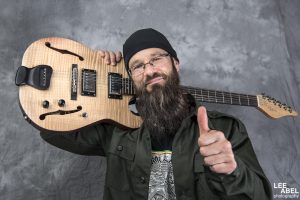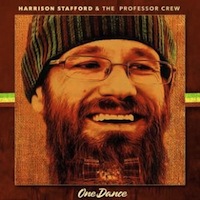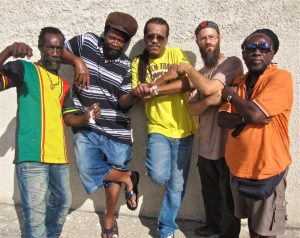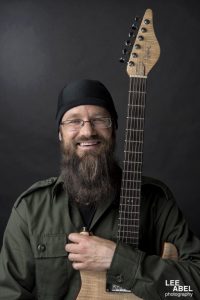The Island Sound presents the full-length Exclusive Interview with Harrison Stafford, The Professor.
The evolution of Harrison Stafford has been a lifelong process. The Professor first became a student of music, soaking up classic jazz tunes from his father, a pianist, as well as Stafford’s older brother, an avid reggae enthusiast. 
Born in California to a Jewish family, Stafford was exposed to Jamaica and the Rastafari community on winter and summer trips with his family throughout his childhood.
The music, the energy, and the message spoke to the young reggae student, whom would soon become the man we know today.
Throughout the years, Harrison Stafford formed one of the most successful reggae bands in history to come out of the United States, as the lead singer of Groundation, and created and taught his own course, The History of Reggae Music, at the college level, and even produced one of the more influential documentaries on Rastafari and Haile Selassie.
Now, Stafford has released his latest solo album, One Dance. In celebration of his latest studio recording, Harrison Stafford spoke with The Island Sound, discussing his lifelong involvement with reggae music, the country of Jamaica and his passion for singing about love, justice and harmony.
Without further ado, here is the exclusive interview with Harrison Stafford, The Professor…
The Island Sound: Not many reggae artists or bands from the United States are welcomed with open arms in Jamaica. With your time spent in Jamaica, how do you feel you, as The Professor and Harrison Stafford, the frontman from Groundation, have been received by the Jamaican reggae community?
Harrison Stafford: Most of the musicians in Jamaica know Groundation from performing at festivals all around the world. From many of my friends that I know, there is a big following in St. Ann’s Bay and even Ocho Rios. I went to Calabash, the Ital Rasta Restaurant, and an elder Rasta Dread came up, recognized me and couldn’t believe he met me. I didn’t expect this elder Rasta to know Groundation. I think it comes from the fact that we are militant and we are focused. I love to play roots music and the message is 100% about equal rights and justice, while forming a better world for our children. I think Jamaicans feel that. Jamaicans judge you on the music and the works that you do, not judging a book by its cover.
The Island Sound: In November of 2015, your documentary Holding on to Jah was released. What led you along the path to produce this documentary?
Harrison Stafford: It really came out of teaching the History of Reggae Music course at Sonoma State University. I would have Joseph Hill of Culture, Israel Vibration, and other musicians come and speak to the class. I called on my friend, Roger Hall, to film these lectures. That is where the whole documentary began. Just to film this story and these elder Rastas that were there in 1966 to see his majesty, Haile Selassie, come to Jamaica. That moment was really an epiphany and a huge turning point in the history of all humanity. Selassie was brought to Jamaica and paid by the Jamaican government to disavow the belief that he was the Messiah and God. As he met with the elders and Rastas, he said “I am who you say I am”. The government was trying to squash out this cult and slow this movement. Instead, it blew up! And, this film, Holding on to Jah, is really centered around this moment, during Selassie’s visit. It is a beautiful and powerful story that I believe is crucial to now. It’s all about the future. It’s all about one love and togetherness.
The Island Sound: For the new album, One Dance, how did your connection with legendary reggae drummer Leroy “Horsemouth” Wallace come to fruition? 
Harrison Stafford: When I was a kid, maybe 16-years-old or so, I became friendly with Cedric Myton of the Congos. Through the years, I kept the link and produced one of the Congos album in 2000 at Tuff Gong Studios in Jamaica. Cedric was the one who brought in Leroy Wallace. I knew Horsemouth from his work at Studio One and his work on the film, Rockers. We struck a big friendship and bond from those recordings sessions. We did a few tours with Groundation, a tribute to Bob Marley. From there, the relationship grew.
The Island Sound: I must say, my instant top track from the new album is “The Music”. However, there is a backing track that begins on the song, “Young Dread”. As a listener, it sounds like a motivating, eye-opening speech to a mass audience. Describe the usage and origin of that track to begin that song.
Harrison Stafford: I had been looking for the opportunity to use that speech by Mario Savio for a long time, really for over twenty-years. Mario Savio was a leader for equal rights, civil rights and for freedom of speech. Mario Savio was a major influence on me. When it came to university, the only school I applied to was Sonoma State University, because Mel Graves taught in the Jazz program and Mario Savio was teaching at the university. I was able to meet Mario Savio and speak with him a few times before he passed away. He has been a leader for a long time. The song “Young Dread” was about the struggles and about the system. I believe the speech is called “Operation of the Machine”. So, it’s really about those that have power and incredible wealth to be able to manipulate and rule people. But, at the same time, giving them the appearance of freedoms, liberties, and democracies. So, this was the perfect song to use this speech. It comes off as very powerful from a very passionate person. It really punches home the message of the song. Even though that speech was given in 1954, here in 2016, we need that Mario Savio energy.
The Island Sound: In the music industry, many performers across all genres have been granted nicknames by their audience, fans or contemporaries. In the reggae genre, you are referred to as The Professor. How does that nickname feel to you?
Harrison Stafford: It feels interesting. I am definitely honored to have that nickname. I am proud of teaching the History of Reggae Music, to which I was a professor at the university level. I think some of the first people who started calling me the Professor were Horsemouth, Israel Vibration, the Congos and Rocky Allen Bailey. It made sense, because that is how they really knew me, was teaching the history of this music. When I released the first solo album in 2011, under the name of Professor, I thought it was very fitting. It was me, embracing the name Professor. The album was about my pilgrimage in the West Bank and occupied territories of Israel, while trying to represent that Palestinian voice. To me, that was really me, professing about that situation. I have embraced and really come to love that name, Professor.
The Island Sound: Now, Harrison Stafford and The Professor Crew has a pretty hefty touring schedule this summer, featuring performances at some of the world’s biggest reggae festivals. What will your touring band look like for these upcoming dates?
Harrison Stafford: I am really excited about this touring band. So, this is my crew. It is Harrison Stafford and The Professor Crew. For the album it was the legendary Jamaican musicians recording with me. It’s reggae music pure and true. So, I wanted to collect the musicians who were  powerful and true to the genre. We are keeping a lot of that foundation for the upcoming tour. Because of touring schedule conflicts, Errol “Flabba” Holt could not do the tour, as he plays bass for Israel Vibration. Dalton Brownie plays guitar for Freddie McGregor. These are big touring groups out of Jamaica that work consistently. Unfortunately our tours just overlapped in terms of time, but that is the way it goes sometimes. Horsemouth will be there, playing drums, which is fantastic, Lloyd “Obeah” Denton will be there and Andrew “Bassie” Campbell, as well. I also have some young people, some reggae, jazz musicians that I know here in the Bay Area, and one with Brazilian roots. So, Eduardo Gross will play lead guitar, and Craig Berletti, a young trumpet player, who will also play some B-3 organ and piano. We will have six musicians on tour with three Jamaicans and three Californians. Between the six of us, there is somebody that was born in the 1940s, 1950s, 60s, 70s and 80s.
powerful and true to the genre. We are keeping a lot of that foundation for the upcoming tour. Because of touring schedule conflicts, Errol “Flabba” Holt could not do the tour, as he plays bass for Israel Vibration. Dalton Brownie plays guitar for Freddie McGregor. These are big touring groups out of Jamaica that work consistently. Unfortunately our tours just overlapped in terms of time, but that is the way it goes sometimes. Horsemouth will be there, playing drums, which is fantastic, Lloyd “Obeah” Denton will be there and Andrew “Bassie” Campbell, as well. I also have some young people, some reggae, jazz musicians that I know here in the Bay Area, and one with Brazilian roots. So, Eduardo Gross will play lead guitar, and Craig Berletti, a young trumpet player, who will also play some B-3 organ and piano. We will have six musicians on tour with three Jamaicans and three Californians. Between the six of us, there is somebody that was born in the 1940s, 1950s, 60s, 70s and 80s.
The Island Sound: Aside from touring in Europe this summer, are there any plans to tour the United States or South America?
Harrison Stafford: Yes, I am hoping to. I did a few local dates here in California back in January. Groundation is taking a break right now. It is something that we had planned for many years. It is nice to be home with the family. It has allowed me to do some simple Bay Area shows and I plan on doing that again in the fall. Holding on to Jah was released this past November, so I am planning to do a combo lecture, film showing and then a performance at universities. I can do that throughout California in San Francisco and San Jose and then come home at night and be with my family. It is something simple and nearby, while also promoting the film, promoting reggae music, performing and spreading the message; doing all the things that I love. But, touring in the United States is not easy. For us, Groundation, Harrison Stafford and The Professor Crew, touring Europe and South America, there is a big fan base, great response and lots of people. The United States, well, it’s not that easy. There are certain parts like California, Hawai’i, Oregon, Florida, Washington D.C., but, doing a whole U.S. tour is a challenge. It is something that we don’t do very often, if at all.
The Island Sound: What do you attribute those challenges to in the United States compared to South America or Europe?
Harrison Stafford: This is the United States of America. We are united in the fact that we are these fifty states from people from all walks of life. Brazilians have their own culture, spirit and own way. Here in America, we have millions of cultures, spirits and ways. Some places are  really friendly and very open to reggae music and that type of consciousness. And, some places are not. We don’t have a firm identity. Reggae music works in Europe because there is a culture of accepting the arts. They are not so much into pop fads. They would much rather see a Groundation show rather than a Miley Cyrus show. They are looking for that cultural identity. Americans are more apt to stay in their houses, watch their flat screen TVs, watch their DVDs. Europeans go out and celebrate the arts every day of the week. There is a community in Europe for reggae. In America, there are no TV shows or programs celebrating reggae music in the big, main medias. There are no magazines promoting reggae music. I think Reggae Report was the last one. There are a lot of challenges that reggae music has here in America, specifically roots reggae music or progressive music, cutting edge music. You have to really work hard to gain your fan base.
really friendly and very open to reggae music and that type of consciousness. And, some places are not. We don’t have a firm identity. Reggae music works in Europe because there is a culture of accepting the arts. They are not so much into pop fads. They would much rather see a Groundation show rather than a Miley Cyrus show. They are looking for that cultural identity. Americans are more apt to stay in their houses, watch their flat screen TVs, watch their DVDs. Europeans go out and celebrate the arts every day of the week. There is a community in Europe for reggae. In America, there are no TV shows or programs celebrating reggae music in the big, main medias. There are no magazines promoting reggae music. I think Reggae Report was the last one. There are a lot of challenges that reggae music has here in America, specifically roots reggae music or progressive music, cutting edge music. You have to really work hard to gain your fan base.
The Island Sound: You mentioned the current break that Groundation is on. How long in advance did you plan that and what does the future hold for Groundation?
Harrison Stafford: For sure tour dates in the future. Touring is not easy. Our drummer, Te Kanawa, needed to get back home to his family. After being busy for the last ten years, constantly on the road, he had to be home with the family and be a dad to his young girls. We have been talking for a few years about doing this and taking a break. We just needed to find the right time for everyone to take a break, find a new drummer and freshen up a bit to comeback strong. So, that is the process we are in right now.
The Island Sound: To conclude, what do you hope the listeners digest and understand from the new album, One Dance?
Harrison Stafford: I hope the new album inspires the listeners. A lot of emotion and a lot of feelings go into the music. The overall theme of the album is a sense of oneness. We all need to understand that we are not members of communities, religions, races and classes, but we are members of the human race. Our allegiance and responsibility is not to these nations, but to the whole of humanity. That is what I hope people get from the One Dance album. The response has been really positive. This music is different than Groundation music. This music is written for these musicians featured on the album. This is pure reggae, clean and sweet music, focused on the lyrics and the presentation of the song itself.
Harrison Stafford Links
Website
Facebook
YouTube
iTunes
Video: Harrison Stafford & The Professor Crew – “One Dance”
